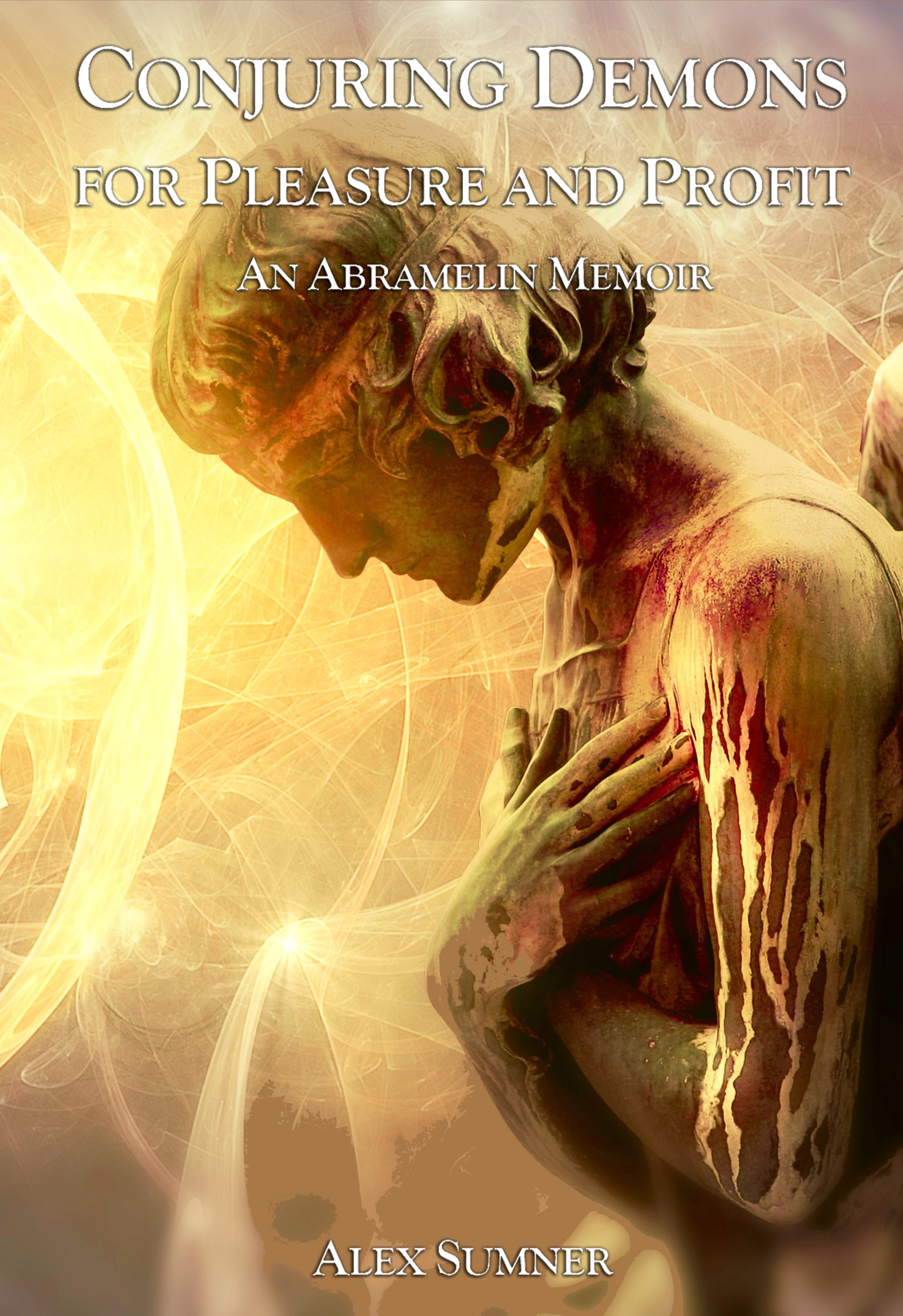As promised in my previous post, here is my review of the second of two books from the Gallery of Magick which I have read recently. Angels of Wrath by Gordon Winterfield may be said to tackle the subject of what certain occultists on social media refer to as “Baneful Magick,” that is, the magick of cursing people, with death, injury, illness, or just unpleasant life circumstances.
But first I would like to digress – and address the subject of the Dark Fluff phenomenon.
Apparently this term was coined by Jake Stratton-Kent to refer to a trend in modern occultism which deals with dark themes such as demons, qlippoth, Satanism, Luciferianism, “the Adversarial Path,” etc etc etc, but which when subjected to critical analysis is found to be just as superficial as so-many badly written books by fluffy-bunny neo-pagans. Actually I wonder whether this is a generational thing? With the cooler, more serious – and older – occultists being cast in the role of Boomers, and the Dark Fluffsters playing the role of the Millenials?
But to return from my sub-digression to my digression. Whilst Jake Stratton-Kent was undoubtedly correct on the one hand, it would be a mistake to assume that it is a modern phenomenon. That is, if you go back through history, you will find “it was ever thus” – that Dark Fluffiness has always existed, not under that name, but as the idiot younger brother to serious occultism. Indeed, one of the worst perpetrators of Dark Fluffiness in modern times was in fact this man:

J’accuse Arthur Edward Waite: perpetrator of Dark Fluff!

The evidence…
Yes indeed. Whilst to many Waite is responsible for pompous, ponderous texts which piously advocate mysticism whilst decrying magick, and which are so verbose one would think he was being paid by the line to write (I’ve seen some of his rituals which he had privately printed, so I can confirm he wrote that way for free!), yet he shamelessly and deliberately exploited the Dark Fluff phenomenon when he wrote The Book of Black Magic, in that he deliberately focused on the most lurid and notorious of the black magic grimoires. In so doing he managed to reinforce popular prejudice against ceremonial magick – and retard intelligent scholarship on it for almost a century!
Take for example the subject of making Pacts with spirits. In this book, Waite focusses on grimoires, such as the Grimoirum Verum, which imply that making Pacts necessarily involves selling your soul to a demon. Aleister Crowley, even though he never missed an opportunity to excoriate Waite on any other occasion, in writing himself about black magic unwittingly followed this trope without question – as did many other occultists of the twentieth century – because they knew no better.
We now know, however, thanks mainly to the research of people like Stephen Skinner and David Rankine, that there are and have been other grimoires which paint a much different picture – that a Pact is simply where you get an evoked spirit to agree that it recognizes the authority by which you have summoned it, and that it agrees to perform your instructions. The MSS for these grimoires were no more nor less accessible than those of which A E Waite made use when writing his Book of Black Magic, so why did he not refer to them at the time – to provide a more balanced view of the subject?
The answer can only be that lurid, sensational tales of Faustian pacts, satanic rites, and diabolical sorcery sell books, whilst works which are balanced and scholarly are, quite frankly, boring. Far from being the man of integrity as which Waite wanted to portray himself, he deliberately pandered to the salacious fascination of his readers, because he wanted to make money from his book. This is exactly the aesthetic for which Serious Occultists criticize the Dark Fluff movement!
There is a quite separate criticism of Dark Fluff, in that Supposedly Serious Occultists (to whom I shall refer as “SSOs” henceforth) claim that most of it is just made up. To which I would have to disagree. Some of Dark Fluff is not made up, but based on bona fide sources – it’s just presented in a manner which horrifies the SSO. So for example, people like E A Koetting – say what you will about his egregious marketing technique (e.g. like the fact that it’s egregious), but he does base much of his material on actual historical magick.
A large part of Dark Fluff is admittedly invented, but this is justified by the authors on the basis that is based on Chaos Magick, or their own magickal workings (and hence, UPG). The Simon Necronomicon is, of course, outright fiction, but is nevertheless defended by its supporters who claim that it works notwithstanding.
So for instance, “Angels of Wrath” – which was the original point of this blog post. It is a book intended for popular consumption, and it contains the influence of the author’s own methods of working which have little to do with the methods of the traditional SSO, instead aiming to get the reader able to practice the magick contained in the book as quickly and easily as possible. It is, however, based on some old kabbalistic sources, at least one of which, the Sepher Ha Razim, is reckoned to date to the fourth century AD, or almost contemporary with the Sepher Yetzirah. However, when looking at the Sepher Ha Razim, one quickly realizes that despite its kabbalistic background, it itself is a lurid sensationalist grimoire in its own right – in other words, it is a 1700 year old Dark Fluff book! However: one could just as easily take the view that it’s no more lurid or sensationalist as, say, the Greek Magical Papyri, or almost any other grimoire from any period in history.
One may therefore claim that Dark Fluff is not a new phenomenon, but may be defined as any (dark) magical practice which is literally Antithetical to the SSOs’ conventional wisdom at the time it is propagated. However, every good Hegelian ought to know what tends to happen “antitheses” eventually…
Incidentally, the Sepher Ha Razim demonstrates that in ancient times Angels were not looked upon as light fluffy beings at all. Kabbalistic Magicians did not have truck with Goetic spirits per se because actual Angels performed all the tasks of the Goetic spirits themselves! I have heard other Jewish sources speak ominously about Angels before (e.g. Z’ev Ben Shimon Halevi) so I wonder if the Angels-good/Demons-bad dichotomy is not a Judaeo-Christian idea at all but merely a Christian one: in other words, it’s not that one is good, the other bad, it’s that they’re all bad.
As to the book “Angels of Wrath” itself: I found that the preparatory exercise which the author proposes, “The Stillness,” to be an excellent meditation in its own right, very effective at inducing an altered state of consciousness, and possibly worth the price of the book by itself. However when it comes to the “baneful magick,” I run up against a problem. To my mind, the only way to ever get good at magick is to practice it repeatedly, and the kind of magick that is described in this book is not the kind that I want to practice even once. Hence this book would only be useful to a magician who is in constant fear for his or her life – e.g. because they live in a war-zone – or is a complete psychopath. Either that or they live in a third world country where the government positively encourages its citizens to defend themselves with deadly force – I suppose that with such a casual attitude to fire-arms, baneful magick must not seem so outrageous.
Angels of Wrath: Wield the Magick of Darkness with the Power of Light by Gordon Winterfield – available as a paperback on on Kindle from Amazon.









